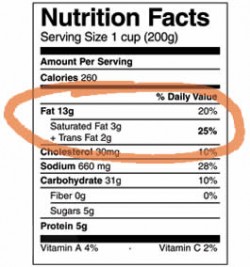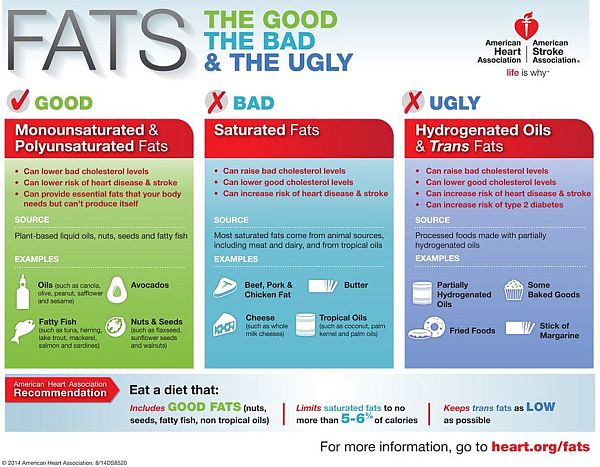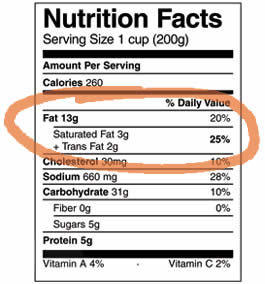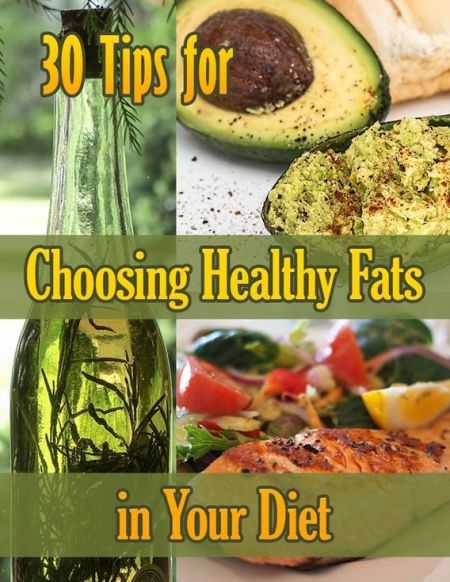Fats are always looked at as a negative in a diet…well in almost all diets anyway, as Atkins tends to think that they are OK.
The reason that most people try to avoid fats is that they tend to be less of a priority for your body to metabolize; the body would rather metabolize the carbohydrates and then Fat or Protein.
Another issue with fat is the number of calories per gram, a gram of fat has 9 calories as opposed to Protein and carbohydrates which have 4 calories per gram. So your body is going to more than likely store any extra fat taken in as, well, fat.
What Kind of Fats in Your Diet to Watch For
So you should watch out for the Fats in your diet in most cases. Still it is important to take in some fats, you body can not exist without any fats and in fact stores vitamins A, D, E and K in fat.
These vitamins are needed to maintain good health. One thing to be aware of is that these vitamins because they are stored in fat can build up and be toxic¦how toxic?
Well I have not heard of anyone getting sick from them but without them you would surely get sick.
Research has shown, because that people who consume a high-sugar diet tend to consume lower amounts of fat and vice versa.
If you think about this it means that your mind will look at a sugary or a fatty food in the same way and will crave both in the same way.
Different Types of Fats in Your Diet

Most people’s questions about fats in your diet are what kind they can eat to be eating healthy.
There are three types of fat that comes from food. Saturated Fats, Polyunsaturated Fats, and Monounsaturated Fats.
All three are found in foods that come from animals or plants, but the amount varies. As a rule, more saturated fat is found in animal than vegetable foods, where more polyunsaturated and monounsaturated fats are found in vegetables than animal foods. Cholesterol is also found in foods from animals.
Saturated fat is mainly found in foods of animal origin, but some vegetables also have large amounts. These are called saturated vegetable fats and are often found in processed bakery goods and nondairy milk or cream substitutes.
These are: Beef, Brazil Nuts, Butter, Cheese, Chocolate, Coconut, Coconut Oil, and Lard
As a rule of thumb when shopping, saturated fats are solid at room temperature. When you have a lot of saturated fat in your diet, your liver responds by making more cholesterol. This raises your blood cholesterol level. It is the most harmful type of fat you can eat.
Polyunsaturated fats come mainly from plants. They are liquid at room temperature. Eating polyunsaturated fat can reduce blood cholesterol levels.
Examples are Almonds, Corn Oil, Cottonseed Oil, Filberts, Fish, Margarine, Mayonnaise, and Pecans
Monounsaturated fats are mainly found in foods that come from plants. They are liquid at room temperature and can reduce blood cholesterol levels, but less than polyunsaturated fats do. They can, however, raise HDL cholesterol (the ‘good’ kind of cholesterol) levels.
Examples are Avocado, Canola Oil, Cashews, Olives, Olive Oil, Peanuts, and Peanut Butter.
Trans fats are what make vegetable margarines have a butter-like texture, and prolong the shelf life of packaged foods. The effects of trans fats are still not known, but it is believed that they, like saturated fats, cause blood cholesterol levels to increase.

As we have learned over the last couple years trans fats can not be metabolized by our body so they are poisonous and very unhealthy
You can see that these Fats in your diet are important but some should be eaten with caution



